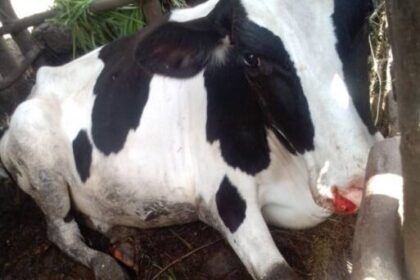Rift Valley Fever Disease Affects 18 Livestock in Ngoma
The Rwanda Agriculture and Animal Resources Development Board (RAB) has announced that 18 livestock have been affected by Rift Valley Fever in Ngoma District.
From late August 2024 to September 9, 2024, 18 animals in the district have been confirmed to have contracted Rift Valley Fever, with one of them having succumbed to the disease.
Currently, seven cows, four sheep, and five goats are infected in the sectors of Kazo, Mutenderi, and Rurenge in Ngoma District.
Dr. Fabrice Ndayisenga, the RAB officer in charge of disease control, said that as soon as the disease was detected, they immediately started vaccinating livestock, beginning in the affected sectors.
Vaccination efforts started on August 30, 2024, and so far, 2,165 out of 10,999 cows have been vaccinated, accounting for 32%. Similarly, 6,144 out of 20,972 goats have been vaccinated, which is 32.5%, and 101 out of 1,028 sheep, representing 56.8%.
He mentioned that vaccination has been completed in the Kazo and Mutenderi sectors and is now being extended to the remaining 12 out of the 14 sectors in Ngoma District.
Dr. Fabrice stated that the disease is caused by mosquitoes, which are present in Rwanda, urging livestock owners to wash their animals at least twice a week and to vaccinate them annually.
He said, “For livestock owners, washing cows, goats, and sheep at least twice a week and vaccinating them annually helps prevent Rift Valley Fever.”
He also advised any farmer with a sick animal to consult a veterinarian for examination and to check for symptoms of this disease, which often include miscarriage in pregnant animals, high fever, and bleeding from the nose.
Rift Valley Fever can also affect humans when they come into contact with the blood or bodily fluids of infected animals, especially those who handle livestock or consume their meat.
RAB urges the public to report any suspected or confirmed cases of animals showing signs of Rift Valley Fever (miscarriages, bleeding from the nose) to local authorities.
It also requested that all livestock (cows, goats, and sheep) in the affected area (Kazo sector) remain confined to their current location, and during this period, no animal is allowed to move from one area to another without a permit issued by an authorized veterinarian certifying that the animal is healthy and indicating its destination.
Livestock farmers are encouraged to use mosquito repellent on their animals, fill water pits, cut bushes near livestock enclosures, and wear protective clothing when attending to suspected sick animals, as this disease can also spread to humans.
RAB further stated that the slaughter of cows, goats, and sheep in Ngoma District will continue but under strict control. Anyone wishing to slaughter an animal must notify the local authorities, and the animal will be tested for Rift Valley Fever, with results available within 24 hours before slaughter is allowed.

